The political rehabilitation of Dick Cheney – courtesy of Donald Trump
Once they called him Darth Vader. Now Democrats are lining up for selfies with the former vice president, writes Andrew Buncombe

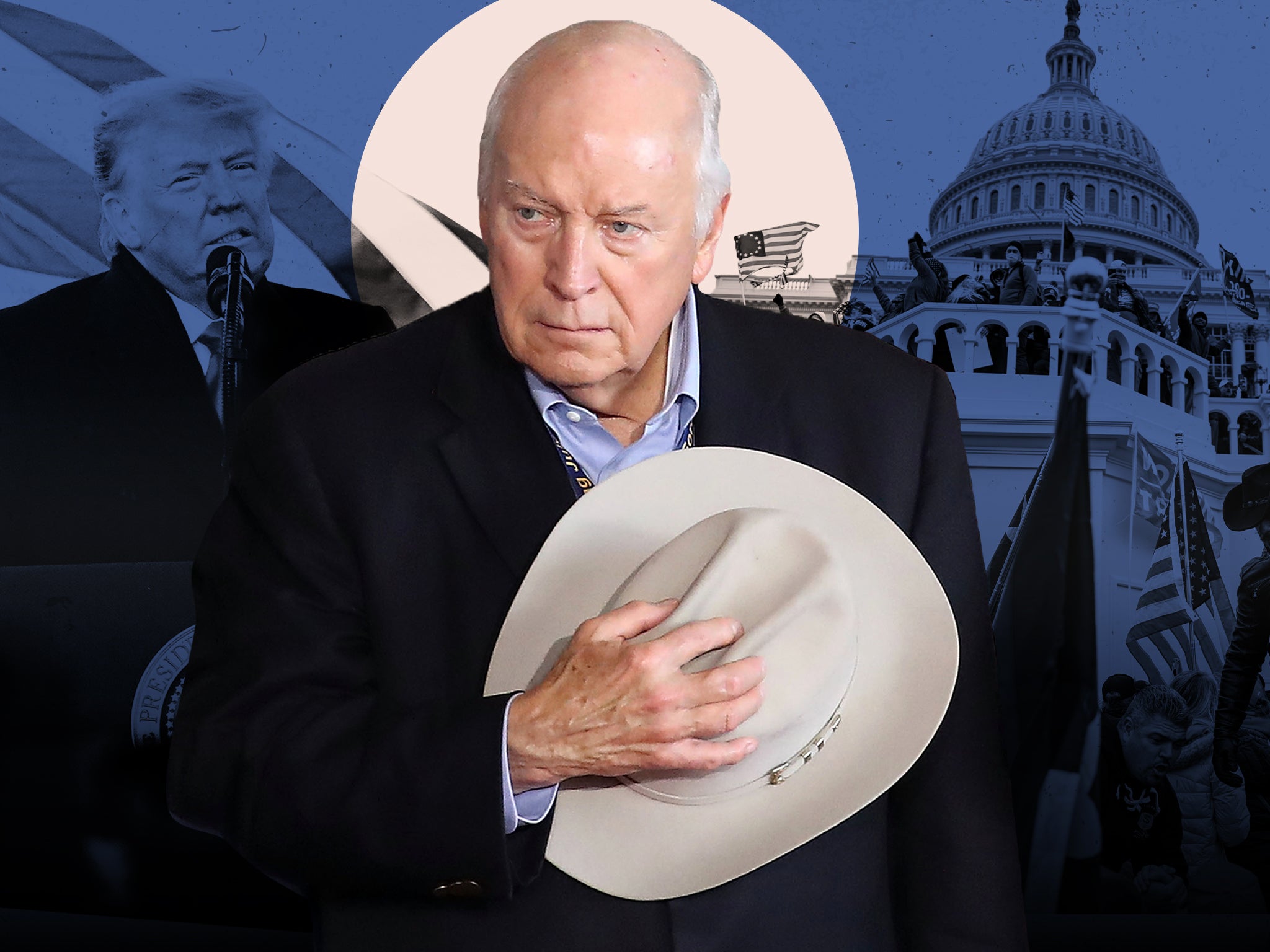
It really was quite a scene. As Democrats gathered on Capitol Hill to mark the anniversary of the 6 January attacks, there was a crush of bodies created by the presence of a man in a dark suit. Some were content to snap a photograph. Others were determined to shake his hand, as if some of that hard-earned West Wing experience might rub off on them.
One might have assumed the cause of such excitement was a Democratic heavyweight such as Barack Obama, Bill Clinton or even perhaps the 97-year-old Jimmy Carter, physically frail but still mentally and morally coherent. It was none of them. Rather, it was former vice-president Dick Cheney, long a target of loathing and outrage for Democrats who saw him in the tip of the spear of America’s long and dark “war on terror” in the aftermath of 9/11.
It was he who helped concoct “evidence” that Saddam Hussein possessed weapons off mass destruction, who pushed for the invasion of Iraq and then defended the US’s use of torture, of rendition and the establishment of secret “black sites” where suspects could be interrogated, sometimes for years, away from prying eyes. People once called him Darth Vader. Now they wanted a selfie.
And the cause for this extraordinary response to Cheney was not that he had suddenly recanted and apologised for what he had done, or published a memoir claiming he had been pushed to act by George W Bush, the president at the time.
There had been none of that. It was simply that the 80-year-old Cheney, along with his daughter, congresswoman Liz Cheney, 55, were the only Republicans who attended the 6 January memorial, with the former vice-president bowing with others for a minute’s silence for those who had lost their lives that day, and to mark the efforts of the police officers who defiantly fought to protect one of the nation’s most potent symbols of democracy.
No other Republican – not Mike Pence, not Ted Cruz, not Mitt Romney, not Kevin McCarthy, not Marjorie Taylor Greene and certainly not Donald Trump, the man charged by Democrats of inciting insurrection – was present.
“I’m deeply disappointed we don’t have better leadership in the Republican party to restore the Constitution,” Cheney told a reporter for ABC News after he left the floor of the House, where as a former congressman who represented Wyoming he still has visiting rights.
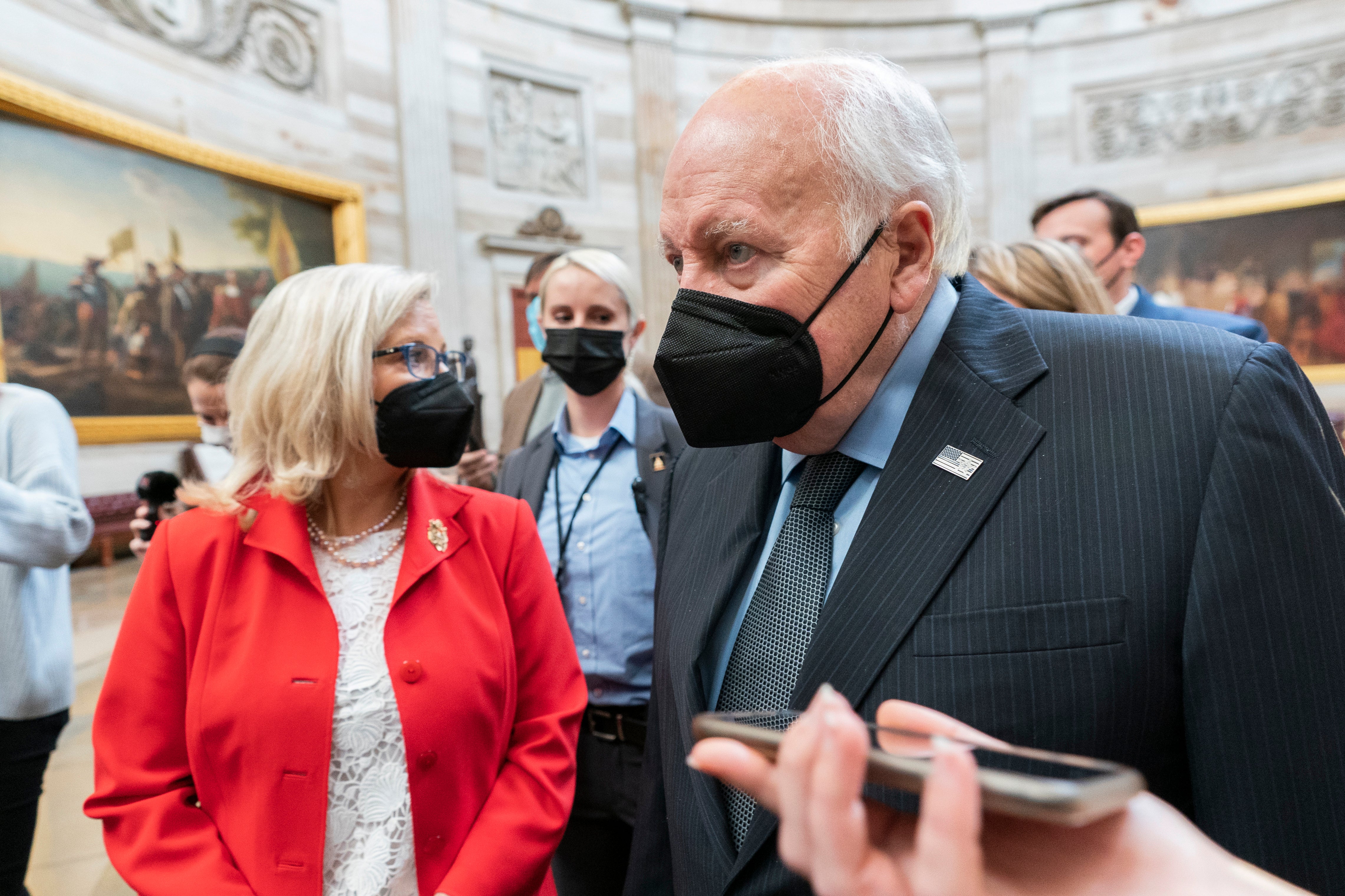
Speaking of the memorial, he added: “It’s an important historical event. You can’t overestimate how important it is.”
Cheney said he believed his daughter could take care of herself. “It’s great coming back. Liz is doing a hell of a job. I’m here to support her,” he said.
And then he was gone.
The whole thing may only have taken an hour or so. But it was an event that revealed much about the current state of politics and political division in the country, and in particular the nature of the GOP, the founding of which goes all the way back to 1854.
During its long history, with icons that include Abraham Lincoln, Theodore Roosevelt, Dwight Eisenhower and Ronald Reagan, the party has at several times points shifted its tone, or reassessed the voters it was seeking to attract.
For instance, Barry Goldwater, a five-time senator from Arizona who ran for the presidency in 1964 but was defeated in a landslide by Lyndon Johnson, is considered as having put into motion the grassroots conservative realignment that led two decades later to the success of the “Reagan Revolution”.
Instead of attacking me and, more importantly, the voters of our movement, top establishment Republicans in Washington should be spending their energy in opposing Biden
Seldom though, has the party, or at least an overwhelming chunk of it, been so firmly in the grasp of one individual as it is now. That individual is Trump.
After losing to Joe Biden in 2020 by 306 – 232 in the electoral college and by at least seven million in the popular vote – Trump has continued to exert that grip over the party, over its present and its future. He continues to falsely claim the election was rigged and “stolen” from him, and such has been the effectiveness of that disinformation and propaganda, that at least two-thirds of Republicans believe the 2020 contest was unfair.
Nationally, an astonishing one-third of Americans believe Biden only secured the Oval Office “due to voter fraud”.
The same day that hundreds of Trump voters stormed into the Capitol to “stop the steal” after he urged them to “fight like hell”, almost 150 Republican legislators, including eight senators, voted not to certify Biden’s victory. Many cast their votes having witnessed the violence that had erupted around the building where they had sat.
When Democrats in the House went ahead and impeached Trump for the second time, they received the support of just 10 Republicans in the House and seven in the Senate. Trump, for the second time, was spared being the first US president to be convicted in an impeachment hearing.
Even as he continued to overturn the election, Trump started to attack those who had voted against him, denouncing them as unpatriotic and promising to fund primary campaigns against them.
“Instead of attacking me and, more importantly, the voters of our movement, top establishment Republicans in Washington should be spending their energy in opposing Biden, Pelosi, Schumer and the Democrats,” Trump told the Conservative Political Action Conference, one of his favourite events, in February 2021.
Of those who had voted to impeach him, he declared: “Get rid of them all.”
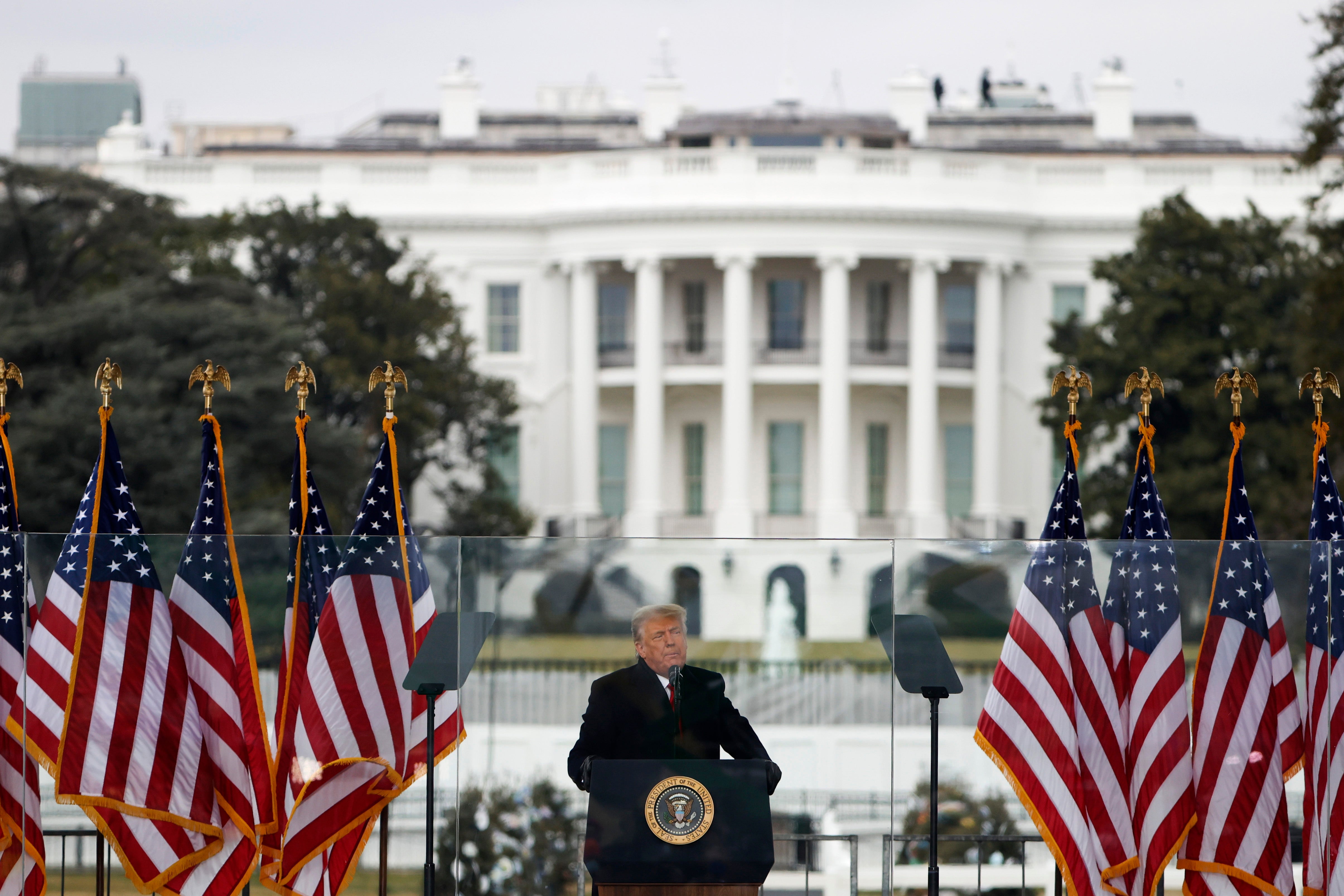
A year, on we have learned a lot more of Trump’s anti-democratic efforts, not simply to block Biden’s victory, but to promote the chances of Republicans – specifically Republicans who support him – in this years midterms and the elections of 2024.
As the House committee probing the storming of the Capitol gathers more evidence, so the public has learned more about the planning and plotting to keep Trump in office, involving everyone from Rudy Giuliani and Steve Bannon to John Eastman, a little known conservative law professor from California who placed in front of Trump a blueprint for how, with the help of Pence, he could hold on to power.
Eastman wanted Pence, who was to preside over the certification process to throw out the results in seven states, to declare Trump the winner in those places, and then conclude that the former reality TV star had gathered more electoral college votes than Biden.
“You really need to listen to John. He’s a respected constitutional scholar. Hear him out,” Trump told Pence at one meeting in the Oval Office on 4 January, according to an account published in the book Peril, by Washington Post journalists Bob Woodward and Robert Costa.
Democrats and Republicans such as congressman Adam Kinzinger termed the document a “memo for a coup”.
More has emerged too of Republican efforts to limit voting rights at state and county level, passing laws that limit access to early and mail-in voting, and reducing the number of polling stations. In many states, supporters of the former president have worked hard to establish a network of pro-Trump election officials, intended not to challenge him as Georgia’s Republican Secretary of State, Brad Raffensperger, did when Trump called him and demanded that he “find 11,780 votes”.
A month earlier, Biden had bagged Georgia with its 10 electoral college votes, the first Democrat to do so since Bill Clinton in 1992.
Biden had won by the narrowest of margins, just 12,300 votes, and the state carried out two recounts. They did not change the outcome and Raffensperger held his ground. “We believe that we do have an accurate election,” he told Trump, during a call being recorded by both parties and rapidly passed to the media.
The prospect of democratic collapse is not remote. People with the motive to make it happen are manufacturing the means. Given the opportunity, they will act. They are acting already
What if Raffensperger had not stood firm? Or what if the next official charged with officiating the election holds more loyalty to Trump than to the constitution?
In a widely noted article published in December 2021 in The Atlantic and headlined Trump’s Next Coup Has Already Begun, reporter Barton Gellman outlined the comprehensive efforts being made to insert or elect Trump loyalists across the nation.
“The prospect of this democratic collapse is not remote. People with the motive to make it happen are manufacturing the means,” he wrote. “Given the opportunity, they will act. They are acting already.”
With Trump still suggesting he may run again in 2024, and with him being the first choice for an overwhelming number of Republicans, there is little space in the Grand Old Party for those not in his thrall.
Of the 10 members of Congress who voted to impeach him, three have announced they will not seek reelection and the others know they are going to face tough primary challenges.
Liz Cheney will perhaps face the most-watched challenge. After initially being defended by House minority leader Kevin McCarthy, a man who briefly attacked Trump for his role in the riot, he turned on her and announced he no longer supported her continuing as chair of the party in the House, the third most senior role.
In May 2021, she was stripped of the position and replaced shortly afterwards by New York congresswoman Elise Stefanik.
At the time, many noted the irony: Cheney, a staunch conservative who had voted with Trump’s position 93 per cent of the time and for many years barely spoke to her sister, Mary, because she was in a same-sex marriage, was replaced by someone whose pro-Trump voting record was just 78 per cent and who had initially entered Congress in 2016, vowing that she would “stand up and talk about it” when she disagreed with him.
When she was elected to Cheney’s job she thanked Trump, who had endorsed her and called him “a critical part of our Republican team”. Her political about-turn was another indication of Trump’s dominance.
Cheney not only voted to impeach Trump, but along with Republican Adam Kinzinger, she agreed to join the House committee investigating the riot, serving as its vice-chairperson. (Trump told Republicans not to cooperate with it, which is why the likes of Steve Bannon, Mark Meadows and members of the Trump family are now being subpoenaed to testify.)
For that alone she has received the disdain not only of Trump but colleagues with whom she worked closely. Last summer it emerged she had been forced to spend thousands of dollars to hire private security guards after receiving death threats.
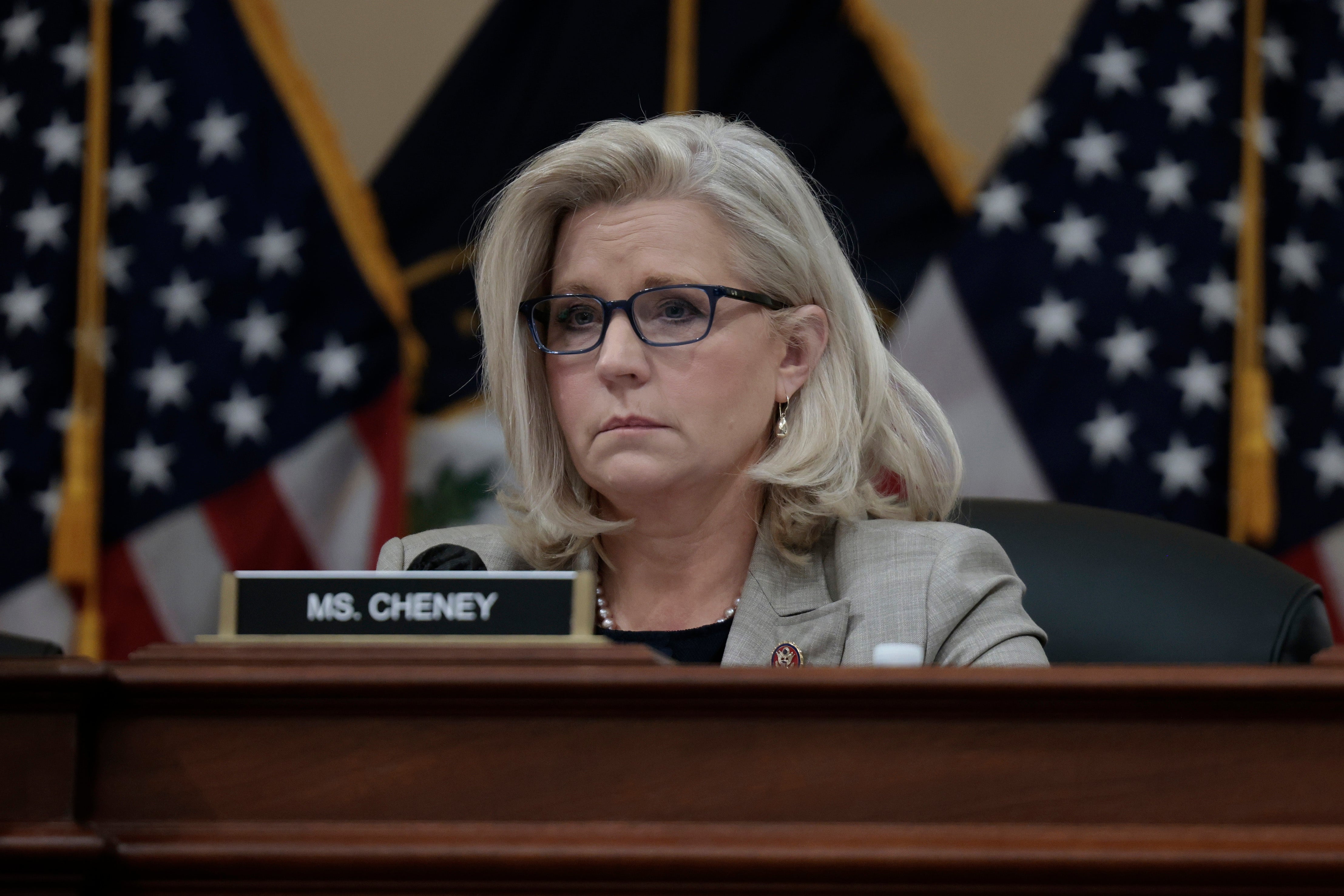
In an interview with the New York Times to mark the 6 January anniversary, Cheney was asked to assess the impact of continuing to challenge Trump, when the majority of her party agreed with him, and not her. “It is my responsibility and my duty and my obligation, and I’m going to continue doing it because I know it’s what’s right,” she said.
“And I believe fundamentally in the goodness of the vast majority of the American people and in the greatness of this country. I’m not going to cede our party and I’m not going to cede the Republic to Donald Trump or those forces who have shown themselves unfit.”
One ally on whose support she has depended has been her father. At 80, Cheney, recipient in 2012 of a heart transplant after a life of heart problems, seems perhaps more sprightly than he did when he was vice-president.
According to his daughter, Cheney’s support has been unstinting. On 6 January 2021 she and other members of the House and Senate were set to certify Biden’s election. She planned to speak from the floor of the chamber in its support. She later told reporters her father had called her, alerting her to the fact that in his fiery speech to supporters on the National Mall, Trump had referred to getting rid of the “the Liz Cheneys of the world”.
Did she still think it wise to proceed?
“Absolutely,” she claims her father said. “Nothing could be more important.”
The president of the United States summoned this mob and lit the flame of this attack. Everything that followed was his doing
As it was, shortly afterwards, the Capitol was stormed by hundreds of Trump supporters, some waving Confederate flags, a handful with baseball bats. Legislators were scrambled to safety, some of them spending hours locked down in secure locations until they were given the all clear.
There had been talk of delaying the certification vote as a result of the chaos, but enough senior figures within both parties felt it essential that the process happen that very night, and so it did, with Pence overseeing the vote that stretched into the early hours of the next day.
He said: “To those who wreaked havoc in our Capitol today, you did not win.”
In the days that followed, a series of senior Republicans would publicly denounce Trump – McConnell and McCarthy among them. None was more damning than Cheney.
“Much more will become clear in the coming days and weeks, but what we know now is enough,” she said of the decision to vote for impeachment. “The president of the United States summoned this mob, assembled the mob, and lit the flame of this attack. Everything that followed was his doing.”
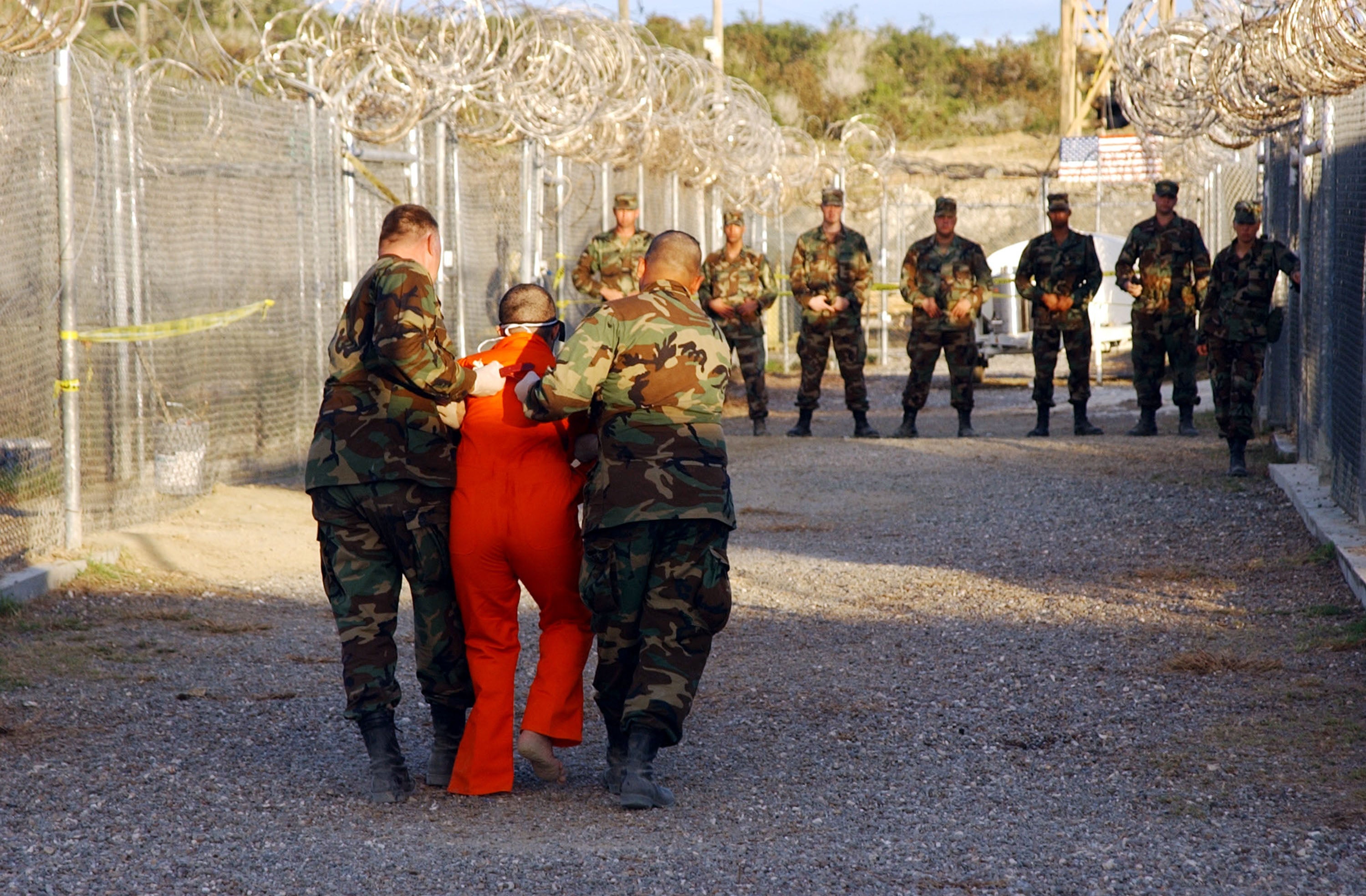
Two decades on, it can sometimes be difficult to remember the hate and loathing many Democrats, and others, felt for Dick Cheney.
In the aftermath of 9/11, Cheney, along with George W Bush, was the focus of criticism from those who felt America’s response to the Al-Qaeda attacks was dishonest and disproportionate.
This was true in the US, but especially so internationally where Cheney, who once worked for Richard Nixon and Gerald Ford, was elected to the Congress and then served as George HW Bush’s defence secretary, would do whatever was required to defend or promote the US’s interests as he saw.
It was Cheney, just five days after the attacks on New York and Washington DC, who outlined what would constitute a decade or more of America’s use of torture, or “enhanced interrogation” techniques, as he and Donald Rumsfeld chose to term them: waterboarding, sleep deprivation, the use of dogs to terrify prisoners
“We also have to work, though, sort of on the dark side, if you will. We’ve got to spend time in the shadows in the intelligence world,” he said. “A lot of what needs to be done here will have to be done quietly, without any discussion, using sources and methods that are available to our intelligence agencies, if we’re going to be successful.”
They’re trying to revise history and make out that Dick Cheney is a moderate Republican ... when he was a total right-wing war criminal
He added: “That’s the world these folks operate in. And so it’s going to be vital for us to use any means at our disposal, basically, to achieve our objective.”
It was Cheney and his chief of staff, Lewis “Scooter” Libby, who oversaw the “stove-piping” of intelligence at the CIA to assert, falsely, that Iraq possessed weapons of mass destruction and links to Al-Qaida, neither of which was true.
He also claimed the Iraqi leader had been “absolutely devoted to trying to acquire nuclear weapons, and we believe he has, in fact, reconstituted nuclear weapons”.
Many believed he was wrong, most notably Hans Blix, the UN’s chief weapons inspector for Iraq. “I said to Condoleezza Rice that we were not impressed by the intelligence,“ Blix later told National Public Radio. “I remember she said, ‘Intelligence is never 100 per cent. But it is not the intelligence that is indicted. It is the Iraqis who are’.”
The invasion went ahead and with it the death and chaos that would ensue. At least 4,431 America troops would lose their lives, along with 179 British soldiers and 139 from other allied nations. The devastation wrought on Iraq, has lingered for years. Hundreds of thousands of civilians lost their lives too.
Cheney was also condemned because a company of which he had recently been the CEO, Halliburton, would earn billions in government contracts supporting the war on terror.
Among those warning of the danger of forgetting the policies Cheney and Bush carried out, the wars they launched, and the human toll they are responsible for, is activist Medea Benjamin. As the co-founder of the group Code Pink, she sought to highlight what she considers war crimes carried out by the US.
“It’s disgusting to see that. They’re trying to revise history and make out that Dick Cheney is a moderate Republican and one that we could talk to, and that he represents the more reasonable wing of the Republican Party when he was a total right-wing war criminal.”
She adds: “He dragged us into this global war on terror, which includes: Guantanamo, prison rendition, torture, the invasion of Iraq, the lies about Hussein’s connection to Al-Qaeda, and weapons of mass destruction. The okaying of wiretapping by the NSA that has turned the US into a state without privacy. I mean, all of this is the history that shouldn’t be forgotten.”
Benjamin says Democrats are so desperate to find anything that has a “bipartisan stamp” on it, and there are few Republicans willing to speak out against Trump.

“And along comes Cheney who is [willing to],” she says. “But you can’t just look at this one moment in the US political scene. You’ve got to look at the history of this guy and the administration that he ran, because he was seen as somebody who was more important than Bush in terms of making policy.”
There is a final irony to the fact that Cheney is now being seen as a bulwark of the constitution; when he was vice president he was accused of pushing, along with lawyers David Addington and John Yoo, the notion of unitary executive theory, the idea theory that president possesses the power to control the entire executive branch and that anything a US president did was lawful, especially in a time of war. People accused Trump of making the same claims.
“Whoever thought there would be a Republican you could dislike more than Dick Cheney,” says Mike Fraioli, a longterm Democratic strategist who has run a number of campaigns. “And along comes Donald Trump, and Dick Cheney is so far in second place it’s amazing.”
Whoever thought there would be a Republican you could dislike more than Dick Cheney. And along comes Donald Trump, and Dick Cheney is so far in second place it’s amazing
Fraioli thinks many Democrats would have little in common with Dick Cheney or his daughter. But “she has integrity in terms of Trump”.
As it is, Cheney is just one part of the administration that launched the war on terror, that has enjoyed a political rehabilitation courtesy of Trump. George W Bush has perhaps been more outspoken than Cheney in his criticism of Trump.
Bush these days appears to spend much of his time painting watercolours and working with charities that help traumatised and injured soldiers. It emerged that after Trump’s inauguration, in which he talked about “the carnage” he believed America had endured under Obama, that Bush turned to Hillary Clinton, the defeated Democrat, and said: “Well that was some weird sh*t.”
Bush also joined Obama, Bill Clinton and Carter, to issue individual statements on the day the Capitol was stormed. “I am appalled by the reckless behaviour of some political leaders since the election and by the lack of respect shown today for our institutions, our traditions, and our law enforcement,” said Bush, now aged 75.
“The violent assault on the Capitol — and the disruption of a Constitutionally mandated meeting of Congress — was undertaken by people whose passions have been inflamed by falsehoods and false hopes.”
Anne Womack Kolton has worked with Dick Cheney very closely. She believes his decision to stand with his daughter on the 6 January memorial, was entirely in character. In the presidential election campaign of 2000, Kolton served as a press aide, and then took a job in the White House. During the 2004 campaign, she was Cheney’s travelling press spokesperson.
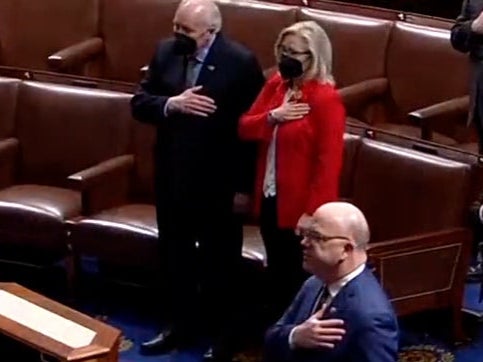
“Dick Cheney has a very clear view of what’s right and wrong, and is incredibly principled. He is willing to stand up for those principles, even when they’re not popular. That’s what you are seeing here,” she says. “He is a strong proponent of liberty, but carrying that with a clear sense of right and wrong. And I think that is what has guided him throughout his political career.”
She says the controversies Cheney was at the centre of during his time as vice-president in relation to the war on terror, can be viewed through a not dissimilar lens. He believes that what he and the administration were doing was in the best interests of the nation.
Is there any similarity to how the nation felt after 9/11 and the attack on the Capitol? Kolton says the two events were very different and has not seen anything Cheney has said drawing parallels. However, she says, “at the heart, you have two instances where the principles that are embodied in our government institutions were under attack again, in very different ways”.
Richard Painter also worked in the Bush administration, serving for two years, as his chief ethics counsel. Painter says he disagreed with much of the foreign policy decisions taken by the president and vice-president, especially in regard to the invasion of Iraq and support of torture. He says Trump did not lead America into another foreign war though he might have.
What he did, he says, was undermine the integrity of the country’s elections: the alleged outreach to Russia ahead of the 2016 election, and his request to Ukraine president Volodymyr Zelenskiy in the summer of 2018 to try to dig up dirt about Biden or his son.
“That is the type of thing that Richard Cheney would never have stood for. The idea of an American politician-elect using a foreign government against a fellow American opponent is very dangerous,” he says. “I think that was the beginning of the fraying of any loyalties to Trump among a lot of traditional Republicans.”
Painter says if he were to speak to Cheney again, he would ask if he regretted pushing the theory of unitary executive presidential power, now he knows the presidency could be occupied by someone as authoritarian by Trump.
Why does he think so many Democrats were lining up to shake Cheney’s hand? “Because we all have our very sharp political differences in the US,” he says. “But we don’t want to live in a dictatorship.”




Join our commenting forum
Join thought-provoking conversations, follow other Independent readers and see their replies
0Comments